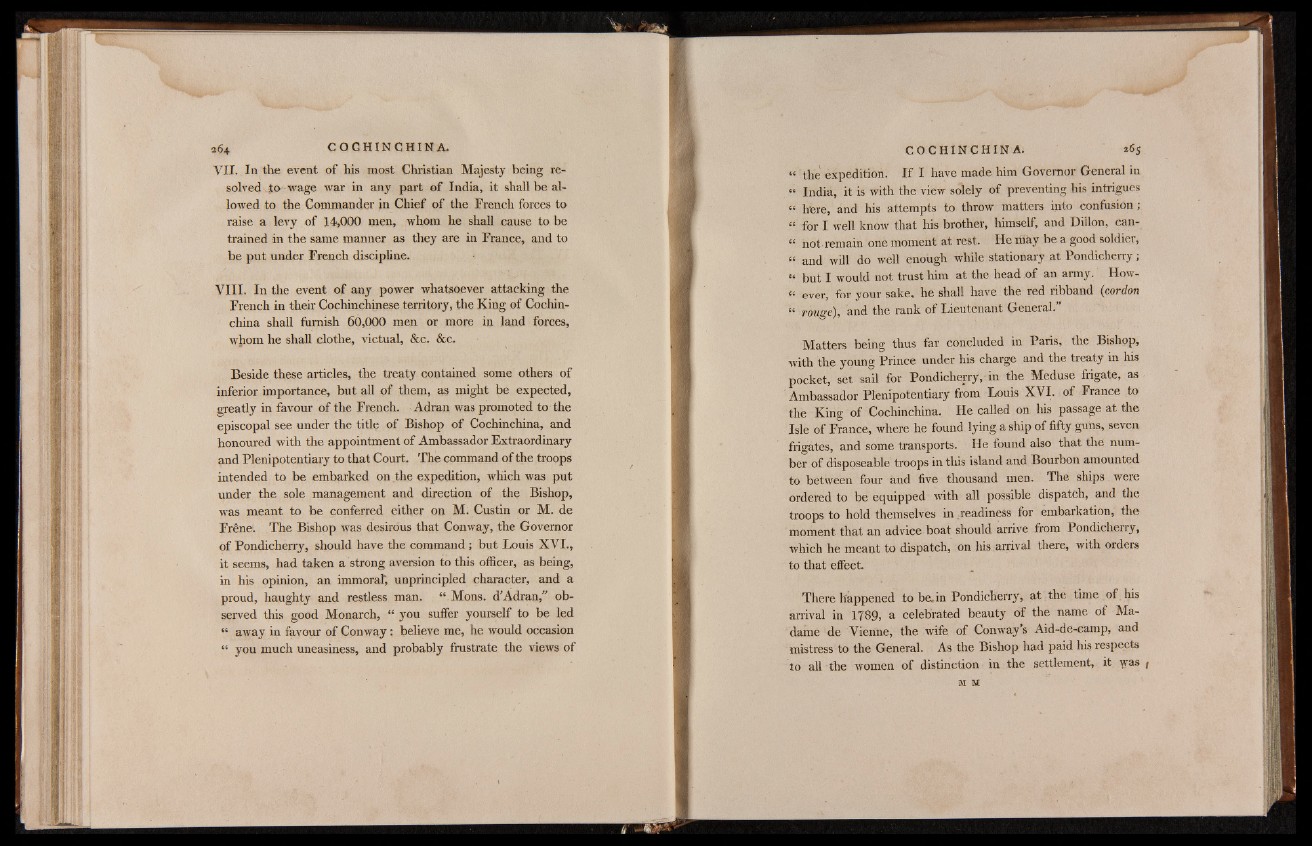
VII. In the event of his most Christian Majesty being resolved
to wage war in any part of India, it shall be allowed
to the Commander jn Chief of the French forces to
raise a levy of 14,000 men, whom he shall cause to be
trained in the same manner as they are in France, and to
be put under French discipline.
VIII. In the event of any power whatsoever attacking the
French in their Cochinchinese territory, the King of Cochin-
china shall furnish 60,000 men or more in land forces,
whom he shall clothe, victual, See. See.
Beside these articles, the treaty contained some others of
inferior importance, but all of them, as might be expected,
greatly in favour of the French. Adran was promoted to the
episcopal see under the title of Bishop of Cochinchina, and
honoured with the appointment of Ambassador Extraordinary
and Plenipotentiary to that Court. The command of the troops
intended to be embarked on the expedition, which was put
under the sole management and direction of the Bishop,
was meant to be conferred either on M. Custin or M. de
Frêne1. The Bishop was desirous that Conway, the Governor
of Pondicherry, should have the command ; but Louis XVI.,
it seems, had taken a strong aversion to this officer, as being,
in his opinion, an immoral, unprincipled character, and a
proud, haughty and restless man. “ Mons. d’Adran,” observed
this good Monarch, “ you suffer yourself to be led
“ away in favour of Conway : believe me, he would occasion
“ you much uneasiness, and probably frustrate the views of
“ the' expedition. If I have made him Governor General in
« India, it is with the view solely of preventing his intrigues
“ here, and his attempts to throw matters into confusion;
1 for I well know that his brother, himself, and Dillon, can-
I not remain one moment at rest. He may be a good soldier,
“ and will do well enough while stationary at Pondicherry;
“ but I would not trust him at the head .of an army. How-
I ever, for your sake, he shall have the red ribband (cordon
rouge)) and the rank of Lieutenant Geneial.
Matters being thus far concluded in Paris, the Bishop,
with the young Prince under his charge and the treaty in his
pocket, set sail for Pondicherry, in the Meduse frigate, as
Ambassador Plenipotentiary from Louis XVI. of France to
the King of Cochinchina. He called on his passage at the
Isle of France, where he found lying a ship of fifty guns, seven
frigates, and some transports. He found also that the number
of disposeable troops in this island and Bourbon amounted
to between four and five thousand men. The ships were
ordered to be equipped with all possible dispatch, and the
troops to hold themselves in readiness for embarkation, the
moment that an advice boat should arrive from Pondicherry,
which he meant to dispatch, on his arrival there, with orders
to that effect.
There happened to be.in Pondicherry, at the time of his
arrival in 1789, a celebrated beauty of the name of Madame
de Vienne, the wife of Conway’s Aid-de-camp, and
mistress to the General. As the Bishop had paid his respects
to all the women of distinction in the settlement, it was ,
M M